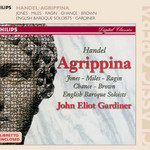
Agrippina (complete opera)
 $53.99
Special Order
$53.99
Special Order3 - 6 weeks add to cart
HANDEL
Agrippina (complete opera)
Alastair Miles / Della Jones / Derek Lee Ragin / Donna Brown / English Baroque Soloists / John Eliot Gardiner
[ Decca Classic Opera / 3 CD ]
Release Date: Sunday 13 May 2007
This item is only available to us via Special Order. We should be able to get it to you in 3 - 6 weeks from when you order it.
"John Eliot Gardiner has not recorded many Handel operas, nor directed many in the theatre. But of course he is a fine and very experienced conductor of Handel and he has a sure feeling for tempo and for the character of each movement. The orchestral playing is beyond reproach. This recording is comfortably among the half-dozen finest recordings of Handel operas, and has a much more powerful cast than its only competitor, on Harmonia Mundi, to which it is much to be preferred." (Gramophone)
Handel's three-act opera seria Agrippina sets a libretto by Cardinal Vincenzo Grimani. The opera tells the story of Agrippina, the mother of Nero, as she plots the downfall of the Roman Emperor Claudius and the installation of her son as emperor.
Agrippina was premiered in Venice some time in December 1709 or January 1710; the date is usually given as the 26th of December 1709. The cast consisted of some of the leading singers of the time in Northern Italy.
Written when Handel was just 24, Agrippina was one of his first operas, and demonstrated his assimilation of the Italian style of opera, after his time spent in Rome composing Italianate cantatas and absorbing the influence of Alessandro Scarlatti, whom he had met in the city.
"Agrippina is Handel's Venetian opera, composed in 1709 for the S. Giovanni Grisostomo theatre, where it was evidently and deservedly a great success; according to Handel's first biographer, the audience were struck with the "grandeur and sublimity of its style". Agrippina is a very effective piece, if directed with due vitality (as it certainly is here), and it is full of appealing music in a wide variety of moods.
The plot is a typically Venetian, and largely fictional, account of an episode in Roman history, chiefly referring to the Empress Agrippina's intrigues to see her son, Nero, on the imperial throne in succession to her husband, Claudius. There is a marked comic element as the two women, Agrippina and Poppea, manipulate the largely guileless men unfortunate enough to cross their paths. The big, near-tragic moment comes in Act 2, where Otho, in spite of his loyalty to the emperor and his devotion to Poppea, is universally betrayed. He then sings a passionate and poignant lament ("Voi che udite il mio lamento") which, in any good performance of the opera, is its high point. It certainly is that here. Michael Chance sings it magnificently, with great depth of feeling and beauty and evenness of tone. Chance is no less impressive in his other arias. The role of Otho was originally sung by a woman, but such a performance as this disarms criticism.
Any admirer of countertenor singing should be prepared to buy the set for Michael Chance's singing alone. But in fact there are two other countertenors here who are well worth hearing, especially Derek Lee Ragin, whose high-lying voice and sensitive, thoughtful phrasing serve Nero's music admirably. His last aria, a brilliant piece with colourful instrumental writing, is breathtakingly done, fiery singing with very precise execution. The third of the countertenors is Jonathan Peter Kenny as Narcissus, who provides some particularly musical singing in his aria near the end of Act 2.
Della Jones gives a masterful performance in the title-role. Her music is very varied in mood: there are several brief and catchy little pieces, which she throws off with spirit, but also some larger-scale numbers, such as the marvellous C minor aria near the end of Act 1, which is done with great vigour, and the noble, invocation-like "Pensieri, voi mi tormentate", another of the opera's high points, to which she brings much intensity. Her commanding singing is ideal for Agrippina.
John Eliot Gardiner has not recorded many Handel operas, nor directed many in the theatre. But of course he is a fine and very experienced conductor of Handel and he has a sure feeling for tempo and for the character of each movement. The orchestral playing is beyond reproach. This recording is comfortably among the half-dozen finest recordings of Handel operas, and has a much more powerful cast than its only competitor, on Harmonia Mundi, to which it is much to be preferred." (Gramophone)